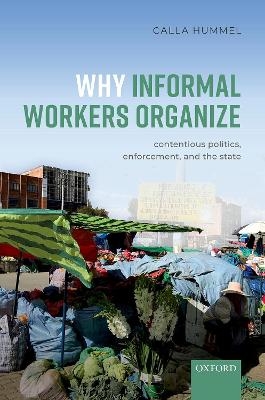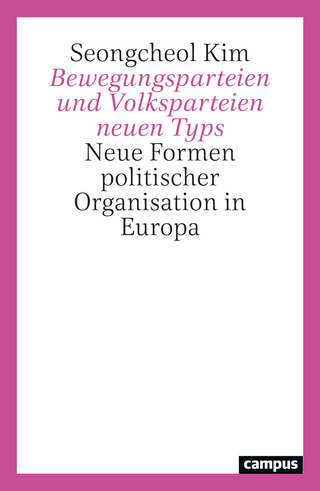
Why Informal Workers Organize
Contentious Politics, Enforcement, and the State
Seiten
2021
Oxford University Press (Verlag)
978-0-19-284781-2 (ISBN)
Oxford University Press (Verlag)
978-0-19-284781-2 (ISBN)
This book examines the organization of informal workers across the globe, and the differing degrees to which they vary. The reality of informal work described in this book is supported by surveys in 60 countries, over 150 interviews with informal workers in Latin America, ethnographic data, and administrative data.
Informal workers make up over two billion workers or about 50% of the global workforce. Surprisingly, scholars know little about informal workers' political or civil society participation. An informal worker is anyone who holds a job and who does not pay taxes on taxable earnings, does not hold a license for their work when one is required, or is not part of a mandatory social security system. For decades, researchers argued that informal workers rarely organized or participated in civil society and politics. However, millions of informal workers around the world start and join unions. Why do informal workers organize? In countries like Bolivia, informal workers such as street vendors, fortune tellers, witches, clowns, gravestone cleaners, sex workers, domestic workers, and shoe shiners come together in powerful unions. In South Africa, South Korea, and India, national informal worker organizations represent millions of citizens. The data in this book finds that informal workers organize in nearly every country for which data exists, but to varying degrees. This raises a related question: Why do informal workers organize in some places more than others? The reality of informal work described in this book and supported by surveys in 60 countries, over 150 interviews with informal workers in Bolivia and Brazil, ethnographic data from multiple cities, and administrative data upends the conventional wisdom on the informal sector. The contrast between scholarly expectations and emerging data underpin the central argument of the book: Informal workers organize where state officials encourage them to.
Informal workers make up over two billion workers or about 50% of the global workforce. Surprisingly, scholars know little about informal workers' political or civil society participation. An informal worker is anyone who holds a job and who does not pay taxes on taxable earnings, does not hold a license for their work when one is required, or is not part of a mandatory social security system. For decades, researchers argued that informal workers rarely organized or participated in civil society and politics. However, millions of informal workers around the world start and join unions. Why do informal workers organize? In countries like Bolivia, informal workers such as street vendors, fortune tellers, witches, clowns, gravestone cleaners, sex workers, domestic workers, and shoe shiners come together in powerful unions. In South Africa, South Korea, and India, national informal worker organizations represent millions of citizens. The data in this book finds that informal workers organize in nearly every country for which data exists, but to varying degrees. This raises a related question: Why do informal workers organize in some places more than others? The reality of informal work described in this book and supported by surveys in 60 countries, over 150 interviews with informal workers in Bolivia and Brazil, ethnographic data from multiple cities, and administrative data upends the conventional wisdom on the informal sector. The contrast between scholarly expectations and emerging data underpin the central argument of the book: Informal workers organize where state officials encourage them to.
Calla Hummel is an Assistant Professor in the Department of Political Science at the University of Miami. She has published in a number of leading journals including the British Journal of Political Science and Comparative Political Studies. Her article in the latter won the journal editorial board's Best Article Award and the Alexander George Best Article Award.
1: Why Do Informal Workers Organize?
2: State Intervention in Collective Action
3: Informal Work in Numbers
4: Street Markets in La Paz and São Paulo
5: Managing Contentious Collective Action
6: How to Make Money While Running From the Cops
7: Conclusion
Theory Appendix
Quantitative Appendix
Fieldwork Appendix
| Erscheinungsdatum | 24.01.2022 |
|---|---|
| Verlagsort | Oxford |
| Sprache | englisch |
| Maße | 165 x 241 mm |
| Gewicht | 488 g |
| Themenwelt | Sozialwissenschaften ► Politik / Verwaltung ► Vergleichende Politikwissenschaften |
| Sozialwissenschaften ► Soziologie ► Mikrosoziologie | |
| ISBN-10 | 0-19-284781-3 / 0192847813 |
| ISBN-13 | 978-0-19-284781-2 / 9780192847812 |
| Zustand | Neuware |
| Informationen gemäß Produktsicherheitsverordnung (GPSR) | |
| Haben Sie eine Frage zum Produkt? |
Mehr entdecken
aus dem Bereich
aus dem Bereich
Geschichte, Parteistruktur, Radikalisierung
Buch | Softcover (2024)
UTB (Verlag)
CHF 38,95
neue Formen politischer Organisation in Europa
Buch | Softcover (2024)
Campus (Verlag)
CHF 82,55


